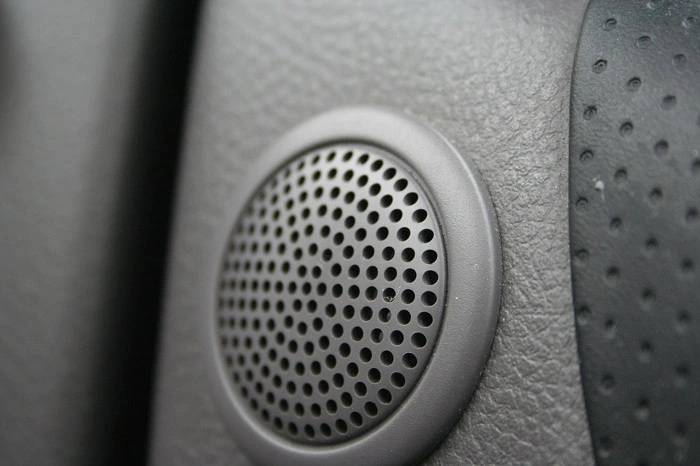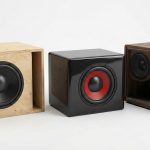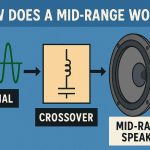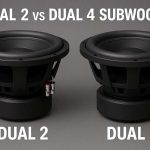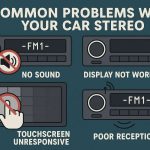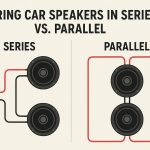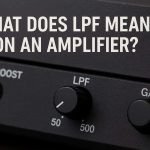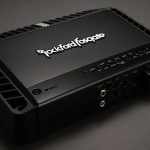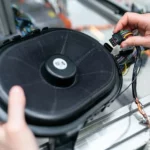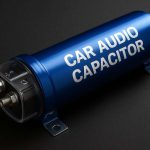Replacing car speakers typically costs $500 for a complete system, with individual speakers ranging from $100-$200 each. Professional installation adds approximately $65 per speaker, though DIY installation is possible for experienced car owners.
|
Quick Answer: |
|
– Basic speaker system: $500 |
|
– Individual speakers: $100-$200 each |
|
– Professional installation: $65/speaker |
|
– High-performance system: $1,000+ |
|
– DIY installation: Possible (saves installation costs) |
Are you tired of listening to low-quality sound from your vehicle speakers? Upgrading your car speakers improves your driving experience with better sound quality. However, before making any purchases, it is important to know how much it will cost to replace vehicle speakers. From speakers to amplifiers to subwoofers, there are a lot of factors to consider. In this post, we will go over the factual data and estimates to give you a better understanding of the cost to replace a car speakers. So, buckle up and let’s dive in!
Importance Of Upgrading Car Speakers
Updating vehicle speakers can significantly enhance your driving experience. Here’s why it’s important:
- The good sound quality of the speakers keeps you focused on the road, reducing distractions and stress.
- You’ll be able to hear music and podcasts in all their glory, with better clarity, less distortion, and deeper bass.
- You’ll make the most of your infotainment system and its features, including Bluetooth connectivity and voice commands.
- Modernized speakers can increase the resale value of your car.
Signs Your Car Speakers Need Replacement:
- They’re producing distorted or crackling sounds.
- Sound is only coming from one speaker or it’s dropping out.
- The volume levels are significantly lower than usual.
- You’re experiencing vibration or rattling noises coming from your speakers.
- The sound is cutting in and out or there’s a delay when playing audio.
- Your speakers have visible dents or damage.
- Your car system is outdated and due for an enhance.
It’s important to keep an eye (and ear) out for these signs, as your speakers are a vital component of your car audio system. If you notice any of these issues, it’s probably time for brand-new speakers.
Remember that the quantity of speakers you need to replace will affect the overall cost- typically, the more speakers you have, the more expensive the replacement will be. Additionally, the size and location of the speakers and the brand you choose will all play a role in determining costs.
On average, car owners can expect to pay around $500 to replace their speaker system, with single speakers costing between $100 to $200. Enhancing to a high-performance audio system can cost up to $1000, with additional accessories like subwoofers and amplifiers costing around $200 each.
Overall, it’s important to weigh the cost of replacement versus the benefits of having a better audio experience in your car. While DIY speaker installation could save you on installation costs, professional installation may be necessary for those less familiar with car audio systems.
In the end, properly maintaining and caring for your speakers can also help improve their lifespan and avoid costly replacements down the road. So keep an ear out for those warning signs, and consider enhancing your vehicle audio system for the ultimate listening experience.
How Much Does It Cost To Replace Car Speakers
1. Average Cost For a Decent-Quality System
When comes to enhancing your car’s audio system, replacing the speakers is often the first step. Decent quality speakers can cost around $500 on average. Here are some details to keep in mind:
- A decent-quality system costs around $500 while a high-performance one can run upwards of $1000.
- Individual speakers usually cost between $100 to $200 each.
- The brand of speaker you choose can affect the price, with high-end models costing upwards of $250 per speaker system.
- The size and location of the speakers can also impact the cost.
- Don’t forget about additional costs for accessories like subwoofers and amplifiers, which can run about $200 each.
Remember, these are just estimates and your actual costs may vary depending on your car, your chosen audio system, and the location of your mechanic.
2. High-Performance Audio System Costs
High audio systems are a popular choice for car enthusiasts who want great sound quality while driving. They come with a hefty price tag, but the audio quality is unrivaled. Here are some things to keep in mind about high-performance audio system costs:
- High-performance audio systems typically cost upwards of $1000.
- The cost of a system will depend on the size and location of the speakers, as well as the brand.
- Additional costs will be needed for accessories like subwoofers and amplifiers, which can range anywhere from $200 to $500.
- The installation of a high-performance audio system should always be left to a professional, which will add to the final cost.
- However, the investment is worth it for those who want the excellent sound clarity possible while driving.
So if you’re looking for the ultimate audio experience while cruising down the road, consider investing in a high-performance audio system. It may come at a price, but the audio quality is unbeatable.
3. Additional Costs For Accessories Like Subwoofers And Amplifiers
Additional costs for accessories like subwoofers and amplifiers:
- While replacing your automotive speakers, you might want to consider adding some additional accessories to improve your sound system.
- Subwoofers are speakers specifically designed to produce low-frequency sounds like bass and drums. They are often used when building a high-performance audio system. A good, decent-quality subwoofer will cost around $200.
- Amplifiers are devices that increase the power of the electrical signal coming from the head unit or receiver of your car stereo. They provide more power to your speakers, making them louder and clearer. Amplifiers come in different types and can cost from $40 up to $400.
- Wiring kits are necessary additions to your audio system when adding subwoofers or amplifiers. It includes cables, fuses, and connectors that will help you connect the subwoofer or amplifier to your vehicle audio system’s power source. Wiring kits can cost around $100.
- Speaker enclosures or boxes are necessary for subwoofers, as they require a separate space to ensure the sound doesn’t bleed into other speakers. Subwoofer enclosures come in different sizes and materials and can cost from $50 to $200.
- Installation costs for adding subwoofers or amplifiers to your audio system will depend on the complexity of the installation process and the location of your mechanic. Expect to pay between $50 and $200 for a professional installation.
- DIY installation is possible, but make sure to follow proper safety procedures when handling electrical wiring. Always use caution and read the instruction manual carefully.
- Remember, adding subwoofers and amplifiers to your vehicle audio system can significantly increase your listening experience, but it also comes with additional costs. Consider your budget and needs before adding any of these accessories.
Average Costs for Each Component
1. Cost Of Typical Car Speakers
When comes to replacing vehicle speakers, one of the biggest factors to consider is the cost. Here’s what you need to know about the cost of typical vehicle speakers:
On average, you can expect to pay between $50 and $200 for a single speaker.
- The cost of your speakers will depend on a variety of factors, including the brand, size, and location of the speakers.
- If you want to save money, you can opt for a set of cheaper speakers. However, keep in mind that the quality might not be as good as more expensive models.
- If you’re looking for a more high-end option, you can expect to pay upwards of $250 per speaker.
- Keep in mind that the cost of replacing all of your speakers can quickly add up. On average, car owners pay between $300 and $800 to replace their car’s speaker system.
- Ultimately, the cost of your new speakers will depend on your individual needs and budget.
2. Average Cost For a New Head Unit
When it comes to enhancing your car’s audio system, the head unit is an important component that you shouldn’t overlook. It’s the central control panel that lets you manage your music and audio settings. But how much should you expect to spend on a new head unit? Let’s take a look at the standard costs:
- A standard DC head unit can cost anywhere between $50 to $100. But lower-end models can go for as low as $30.
- If you want more advanced features like touchscreen displays and Bluetooth connectivity, you may need to shell out around $150 or more.
- Keep in mind that the cost of a new head unit will depend on factors such as the brand, features, and installation fees.
Based on the data, you can expect to spend between $30 to $200+ for a new multimedia unit. It’s important to look for a unit that fits your budget while also providing the features you need. Whether you’re an audio enthusiast or just looking for a simple enhance, a new multimedia unit can make a big difference in your car’s audio system.
3. Amplifier Cost Estimates
A’s sound system is incomplete without an amplifier that boosts weak audio signals from the multimedia unit. Here are some cost estimates for amplifiers based on the wattage:
- A typical factory-installed amplifier in modern cars has a 10W maximum output and does not require a new one.
- An average car amplifier can cost you around $40 to $100 for a maximum power of 75 watts per channel.
- Some amplifiers are made for subwoofers, and others are meant for speakers.
- A good amplifier can handle four speakers simultaneously. Amplifiers that can produce 400 watts or more can cost up to $200 or more.
As a vehicle audio specialist technician, the amplifier’s cost depends on the power, brand, and features you need. It’s essential to match the amplifier’s power to the speakers’ power for optimal performance. Don’t forget to check the warranty offered by the amplifier manufacturer and get your amplifier installed by a professional to avoid problems caused by improper installation.
Factors Affecting The Cost Of Car Speakers
1. Number Of Speakers To Be Replaced
When comes to replacing vehicle speakers, the number of speakers that need replacing will determine the overall cost. Here are some things to consider:
- If only one speaker is damaged or needs to be replaced, you can expect to pay around $100 to $200.
- If two speakers to four speakers need to be replaced, the cost will be anywhere from $200 to $800.
- If a complete vehicle audio system enhance is needed, then you will pay around $500 to replace speakers and the radio unit with a brand new set or $1000 for a high-performance audio system.
Remember, the more speakers that need to be replaced, the higher the cost will be. However, enhancing your vehicle speakers can significantly improve your listening experience while on the road.
2. Size And Location Of Speakers
When comes to replacing vehicle speakers, the size and location of the speakers plays a significant role in determining the budget. In this section, we’ll explore facts on size and location of speakers that can help you make an informed decision:
- The size of automotive speakers can range from 3.5 inches to 6×9 inches, with 6.5-inch being the most common size.
- Door speakers are the most common type of speakers and usually come in standard sizes like 5.25 inches or 6.5 inches.
- Most modern cars come equipped with at least four speakers, but high-end cars can have up to 17 speakers.
- Apart from door speakers, other popular speaker locations include rear deck, dashboard, headrest, and side panels.
- The location of the speaker can impact the audio quality as speakers in the front door and rear tend to produce better audio quality compared to speakers in the dashboard or rear deck.
- In some cars, the location of the speakers can make it difficult to replace them, which can increase the installation costs.
Now that you have a better idea of the size and location of vehicle speakers let’s dive deeper into other aspects that can affect the cost of replacing car speakers.
3. Brand Of The Speaker
When comes to vehicle speakers, the brand is an essential factor to consider for many drivers. Different brands offer various features, quality, and pricing, so it’s essential to know which brand to choose.
Here are some ideas to consider:
- Popular vehicle speaker brands like JBL, Kenwood, and Pioneer offer quality products with different ranges of pricing, making them accessible to different budgets.
- Some brands like Bose offer premium audio systems with high-quality materials and advanced technology for an immersive listening experience.
- Other brands like Focal specialize in high-end audio systems for audiophiles, with products that can range up to thousands of dollars.
- It’s essential to do research and read reviews before deciding on a brand to ensure compatibility with your vehicle and expectations.
Overall, choosing the right brand for your car speaker system can impact the quality and performance of your audio experience. So, it’s crucial to determine what features and budget work for you before making a purchase.
DIY vs. Professional Installation
When comes to replacing your vehicle speakers, you have two options: DIY or professional installation. Each option has its own pros and cons to consider. Let’s take a closer look:
DIY Installation:
|
Pros |
Cons |
|---|---|
|
Can save you money on installation fees |
Requires specialized tools and knowledge |
|
Allows for customization and personalization |
Risk of damaging your car’s electrical system |
|
Gives you a sense of accomplishment |
Installation mistakes can lead to poor audio quality |
Professional Installation:
|
Pros |
Cons |
|---|---|
|
High-quality installation and audio performance |
Can be costly, with installation fees ranging from $100 to $300 |
|
Comes with warranties and guarantees |
Less customization options |
|
Saves you time and effort |
Requires scheduling and waiting for an appointment |
Choosing a Reliable Professional
Here are some tips on how to choose a reliable professional:
- Get recommendations from trusted sources or online reviews
- Verify the professional’s credentials and certifications
- Compare the prices and services of different professionals
- Communicate your expectations and preferences with the professional
Ultimately, the decision between DIY and professional installation comes down to your personal preferences and skill level. If you have experience and the necessary tools, DIY installation can be a great option. However, if you want the peace of mind that comes with a professional job, it may be worth the extra cost.
Step-by-Step Guide For Car Speakers Replacement
Are you ready to replace your vehicle speakers and level up your audio system? Look no further than this step-by-step guide to get the job done right.
- First, disconnect your car battery to ensure safety while working with electrical components. Then, gather the necessary tools, including screwdrivers, a retaining clip remover, and gloves for protection.
- Next, carefully remove the interior panels, grilles, and covers to access the speakers. Be prepared to dig, as some speakers could be hidden under seats or in odd places.
- Once you have removed the old speakers, note the wiring connections and keep track of any screws to make reinstallation easier. Follow the directions for the brand-new speakers and connect them to the existing wiring.
- Take note of the specific installation issues for your car, including factory speaker locations and mounting depth and height. Your Master Sheet instructions will specify the exact tools you need and walk you through the process step-by-step.
- Remember, each car is different, so general tips to keep in mind include thoroughly researching your vehicle, shopping for the right speakers that fit your needs, and carefully replacing interior trim and pieces.
With this guide, you’ll be on your way to becoming a vehicle audio specialist technician and enjoying high-quality sound on your drives.
Tips for Choosing the Right Car Speakers
When comes to choosing the right vehicle speakers, there are a few key tips to keep in mind. Here are some factors to consider:
- Speaker size – make sure to select speakers that fit your car’s openings.
- Power handling – choose speakers that can handle the maximum power output of your car stereo system.
- Frequency range – look for speakers with a wide frequency range for a full and balanced sound.
- Sensitivity rating – speakers with high sensitivity rating produce more volume with less power.
- Impedance – match the impedance of the speakers to your vehicle audio system to ensure compatibility.
- Quality materials – look for speakers with high-quality materials such as Kevlar or polypropylene cones for superior sound.
Keep these tips in mind and you’ll be well on your way to finding the perfect set of speakers for your car. Happy shopping!
Comparing Aftermarket vs. Factory Car Speakers
When comes to automotive speakers, you have two options: factory speakers or aftermarket ones. But how do you choose? Let’s compare the two and look at the pros and cons of each.
Factory Speakers:
|
Pros |
Cons |
|---|---|
|
Designed specifically for your car |
Limited audio quality |
|
Warranty and service from the manufacturer |
Less variety to choose from |
|
Match the car’s interior design |
Higher cost compared to aftermarket options |
Aftermarket Speakers:
|
Pros |
Cons |
|---|---|
|
Wide range of options to choose from |
May require additional modifications |
|
Higher-quality sound |
May void the car’s warranty |
|
Cost-effective |
May not match the car’s interior design |
When considering aftermarket speakers, it’s important to research and find reputable brands and products that will fit your car’s specifications. Enhancing your automotive speakers can greatly improve your driving experience and it doesn’t have to break the bank.
Maintenance and Care For Car Speakers
When comes to vehicle speakers, proper maintenance and care can go a long way in ensuring they last for a long time and sound great. Here are some tips and tricks for maintaining and caring for your automotive speakers:
- Keep your car clean and dry to avoid moisture buildup that can damage speakers.
- Avoid exposing your car to extreme temperatures as this can cause the speakers to warp or crack.
- Install speaker grills to protect the speakers from dust and debris.
- Use a microfiber cloth to clean the speakers gently. Avoid using abrasive cleaners or scrubbing the speakers too hard as this can damage them.
- Be cautious when adjusting bass and treble levels as aggressive settings can cause distortion or damage to the speakers.
- If you notice any issues with the speakers such as crackling or distortion, address them promptly to avoid further damage.
By following these simple tips, you can help ensure that your vehicle speakers sound great for years to come.
Should I Fix or Replace Car Speakers?
You may be wondering, “Should I fix or replace my vehicle speakers?” The answer isn’t always straightforward and depends on a few factors. Here’s what you should consider:
- Age and Condition: If your vehicle speakers are relatively new and in good condition, fixing them can be the more cost-effective option. However, if they’re old or damaged, investing in brand-new speakers could be a better choice.
- Desired Audio Quality: If you’re looking for a significant improvement in your car’s audio quality, replacing your vehicle speakers is likely the better choice. Enhancing to higher-quality speakers can make a significant difference in sound clarity and bass.
- Budget: Of course, budget is always a consideration. Fixing your speakers could be less expensive, but if you’re looking for a significant enhance, investing in brand-new speakers can be worth the cost.
- Time: If your vehicle speakers need to be fixed, it may take more time to repair them than to replace them. Consider if you’re willing to wait for repairs or if you need a quick solution.
Ultimately, the decision to fix or replace your vehicle speakers depends on your goals, budget, and time frame. By understanding the factors at play, you can make an informed decision about your car audio equipment.
How Often Should the Sound System Be Replaced?
How often should you replace your car’s sound setup? The lifespan of your audio system can vary depending on several factors such as your driving habits, maintenance routine, and quality of your components. Here are a few things to keep in mind when it comes to your car’s speakers:
- Speakers typically last between 4-6 years before they start losing their quality.
- Amplifiers and multimedia units can last up to 10 years with proper maintenance.
- Enhancing your car’s audio system can increase its lifespan as newer models often come with better materials and technology.
But when should you consider enhancing or replacing your car’s sound setup? Here are a few signs that your system may need an update:
- Your music sounds distorted or muffled.
- Your system is not producing enough volume.
- Your current sound components are outdated or broken.
- You want better audio quality and features.
In short, the lifespan of your car’s sound setup depends on various factors, and enhancing your system can have its benefits. So, keep an ear out for any sound issues and consider an update if you’re due for an enhance. Happy listening!
Is It Worth Replacing or Upgrading Car Speakers?
Enhancing your vehicle speakers is a great way to improve your driving experience, but is it worth the cost? Here are some factors to consider before making the decision:
- The Age Of Your Car: If your car is relatively new, enhancing your speakers could be a worthwhile investment. However, if your car is older and in need of other repairs, it might not make sense to spend money on speakers.
- The quality Of Your Current Sound Setup: If you’re satisfied with the audio quality of your current system, enhancing your speakers might not be necessary. On the other hand, if you’re frequently blasting music to drown out crackling or muffled sound, brand-new speakers could make a big difference.
- Your Budget: Enhancing your speakers can range from a few hundred dollars to thousands. Consider your budget and whether you’re willing to spend that much on an improvement to your car.
- Your Personal Preferences: Ultimately, the decision to enhance your automotive speakers comes down to personal taste. If you’re a music-lover who spends a lot of time in your car, investing in excellent sound might be worth it to you.
Overall, whether or not it’s worth enhancing your automotive speakers depends on your individual circumstances. However, if you do decide to enhance, investing in high-quality speakers and a professional installation can provide best sound for years to come.
How Can You Tell If a Car Speaker Is Blown?
How can you tell if a car speakers have blown? If you notice any of the following signs, your vehicle speaker may be blown:
- Distortion or crackling sounds
- No sound at all
- Odd vibrations or rattling noises
- Low volume or poor audio quality
What Does a Blown Car Speaker Sound Like?
A blown-out speaker can produce a variety of sounds, including distorted or crackling audio, no sound at all, odd vibrations, or low volume. It’s important to diagnose the issue promptly to avoid further damage to your sound setup.
In addition to uneven or distorted sound, you may also notice rattling or buzzing noises, or even complete silence from your speaker. This can be caused by a variety of factors, including overuse, age, or exposure to extreme temperatures or moisture.
How Long Do Car Speakers Last?
The average lifespan of a car speaker is around 4-6 years, but this can vary depending on factors like usage, maintenance, and overall audio quality. Leveling Up your automotive speakers can improve the quality of your audio and extend their lifespan.
Does a Car Speaker Have a Fuse?
In general, car speakers do not have fuses. However, if you’re experiencing issues with your sound setup, it’s a good idea to check your car’s fuse box to make sure that none of the fuses related to the audio system are blown.
How Long Does It Take To Install Car Stereo?
The time it takes to install a new car speaker can vary depending on the make and model of your car, as well as the complexity of the system you’re installing. In general, a basic installation can take anywhere from 1-3 hours, while more complex systems may take longer. It’s best to consult with an experienced technician to get a better estimate of how long your installation will take.
Final Words and Key Takeaways
After considering all the factors, the final cost estimate for replacing car speakers can vary significantly. Here are some final words on the cost estimates for replacing vehicle speakers:
- The standard cost for a decent-quality system falls between $200 to $1000+. This includes the cost of the speakers and installation.
- High-performance audio systems can cost around $1000 to install, and additional accessories like subwoofers and amplifiers can cost about $200 each.
- The quantity of speakers to be replaced, the size and location of the speakers, and the brand of the speaker all factor into the final cost.
- DIY installation is an option to save money, but professional installation ensures everything is done correctly.
- Maintenance and care for your vehicle speakers is vital to prolong their lifespan and avoid frequent replacements.
- Comparing aftermarket vs. factory vehicle speakers can help you make an informed decision on which ones to choose.
- Ultimately, the cost of replacing vehicle speakers depends on your car, the type of speakers you choose, and the installation method. Do your research, and choose the option that works best for your budget and audio needs.
Frequently Asked Questions (FAQs)
It depends on the speaker type, quality, and installation. The standard cost is $500 per set of speakers.
Not necessarily. You can find budget-friendly options for as low as $20 each speaker. However, high-end speakers can cost over $500 each speaker.
Stereo speakers are usually component or coaxial speakers that have better audio quality than full-range speakers. The full-range speakers are cheaper to purchase and install compare to others. The standard cost of replacing the vehicle audio system is between $500.
Yes, if you want to improve your audio experience. Factory vehicle speakers are typically low-quality and offer poor sound performance. Replacing them with upgraded speakers can enhance the audio quality and performance of your audio system.
Yes, you can enhance your car speakers if you have a tight budget by choosing budget-friendly options that offer decent audio quality and performance for a low price.
No, you do not need to replace all speakers simultaneously if you only want to replace one or a few of them. However, you may want to replace all speakers simultaneously if you want to enhance your entire audio system or if you want to achieve a balanced and consistent audio quality and performance from your audio system.
Generally speaking, aftermarket vehicle speakers are better than factory-installed ones in terms of audio quality and performance. Aftermarket vehicle speakers usually have better features and durability than factory-installed ones. They also offer more variety and customization options than factory-installed ones.
